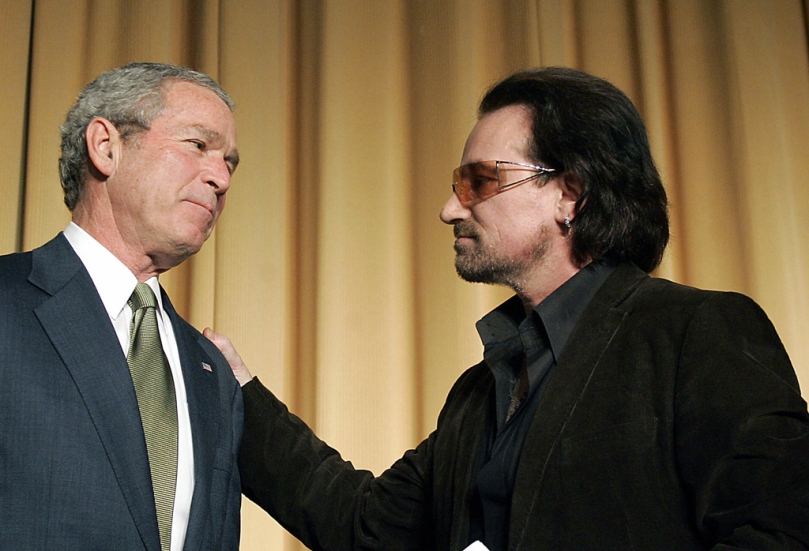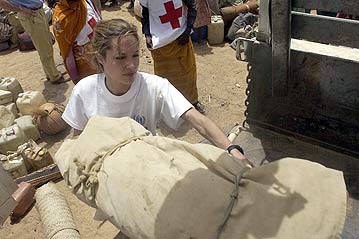RAPOLITIX, pdgc2015a.wordpress.com
Diplomacy is no longer an art exclusive to political leaders and those who people would consider as being “in charge”. The involvement of celebrities in diplomatic practices has increased over the years, which has created somewhat of a “public phenomenon” (Cooper, 2008: p. 2). A number of non-governmental organisations such as Amnesty International, Greenpeace or Oxfam among many have been effective at utilising celebrity figures and their status to further their causes.
One of the reasons why celebrities can “highlight key issues” (UN, 2013) is the fact that these figures tend to be respected and aspired to, or conversely resented, either way their involvement can create an agenda where people will talk about particular issues and perhaps get engaged with the cause.
As seen over the years, celebrities such as Bob Geldof have put together charity groups like Band Aid on numerous occasions to aid starving children in Ethiopia or stop the spread of Ebola on the African continent. Meanwhile, Bono has been busy campaigning governments and corporations for debt relief in the world’s developing countries and in particular lobbying the then-US President George W. Bush to increase USA’s aid package to Africa – which was successfully increased to $9 billion in 2009 (Koehn, 2010).

Dambisa Moyo, a Zambian-born economist and the author of ‘Dead Aid’ has criticised celebrity involvement in foreign affairs and its heavy reliance on promoting aid (particularly in Africa). Moyo has gone as far as calling aid incentives “disasters” (2009) of economic and political proportions. Over the last 50 years, African states have been given a little over a $1 trillion in aid and yet a quarter of Sub-Saharan states are (relatively) doing worse now than in the 1960s (Acemoglu et. Al, 2014).
It is a matter of fact that foreign aid alone does very little to set up effective and most importantly sustainable development. We may throw lots of money at developing states, but such a notion only creates a “cycle of dependency” (Brea, 2007). Poor states will never develop themselves if they continue to be reliant on foreign hand-outs. What developing states need is investment in grassroots projects, where the people themselves have the ability to set up their own institutions necessary for real, sustainable economic growth.

Yet, we should not discredit the work of some celebrities in raising the profiles of certain issues, whether it is Angelina Jolie and her work with the refugee crisis in Darfur or Leonardo DiCaprio’s involvement in climate change efforts. Their activity does create a new agenda, where some action is to be taken and it is then up to all of us to get involved and help create a lasting change. A state’s development has to come from within.
Furthermore, technological innovation within media, particularly the introduction of social media has allowed political leaders and indeed high profile figures to create a new dynamic within diplomacy, where the individuals have an ability to directly speak and convey their messages to the public from around the world.
Dambisa Moyo on why foreign aid is not effective at developing African states.
Interview with Ilan Kapoor at the OEFSE about celebrity humanitarianism. His views are generally sceptical about celebrity involvement in politics, stating that their activity merely looks at “symptoms, rather than causes”.
Bibliography:
Acemoglu D. & Robinson J., 2014, Why foreign aid fails – and how to really help Africa, [online] Available at:http://www.spectator.co.uk/2014/01/why-aid-fails/ (Accessed on 06/04/2016)
Brea J., 2007, Africans to Bono: ‘For God’s sake please stop!’, [online] Available at: https://www.aei.org/publication/africans-to-bono-for-gods-sake-please-stop/ (Accessed on 06/04/2016)
Cole G., 2015, Who really benefits from celebrity activism?, [online] Available at:http://www.theguardian.com/lifeandstyle/2015/jul/10/celebrity-activism-africa-live-aid (Accessed on 06/04/2016)
Cooper A., 2008, Celebrity Diplomacy, Paradigm Publishers, USA
Koehn N., 2010, Bono at 50: The leader we need, [online] Available at:http://views.washingtonpost.com/leadership/panelists/2010/05/bono-at-50-the-leader-we-need.html (Accessed on 04/04/2016)
Moyo D., 2009, ‘Everybody knows it doesn’t work’, [online] Available at:http://www.theguardian.com/society/2009/feb/19/dambisa-moyo-dead-aid-africa (Accessed on 06/04/2016)
UN, 2013, Goodwill Ambassadors, [online] Available at:http://www.un.org/wcm/content/site/sport/home/unplayers/goodwillambassadors (Accessed on 05/04/2016)
No comments:
Post a Comment